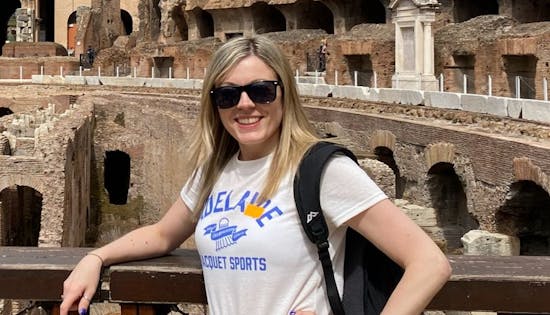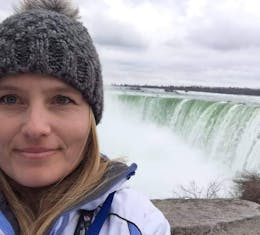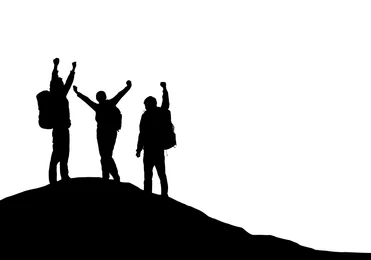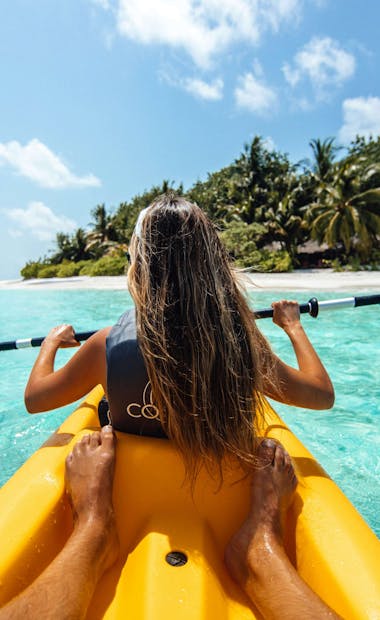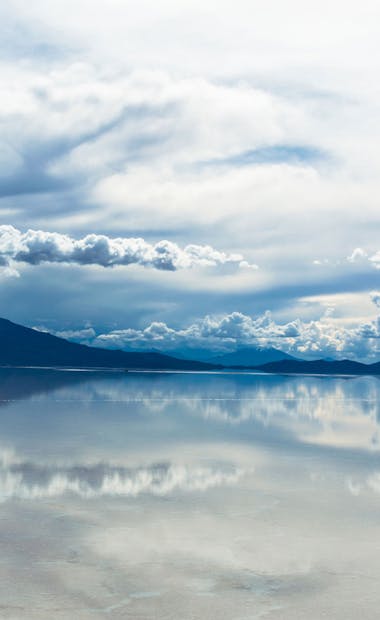
Bolivia Tours
From rain forests to salt flats, explore this lesser known South American gem
Popular tours
- Save25%
 View Tour
View TourBolivia Discovery - 11 Days
- La Paz to La Paz
- Age group: 12 - 100
- Max group size: 16
Was:£1,279From£954 - Save16%
 View Tour
View TourBolivia Highlights - 11 Days
- La Paz to La Paz
- Age group: 15 - 99
- Max group size: 12
Was:£1,465From£1,233 - Save15%
 View Tour
View TourJourneys: Highlights of Bolivia - 8 Days
- La Paz to La Paz
- Age group: 12 - 100
- Max group size: 16
Was:£1,949From£1,648 - Save25%
 View Tour
View TourBolivia to Brazil: Highlands & Coastlines - 31 Days
- La Paz to Rio de Janeiro
- Age group: 18 - 39
- Max group size: 18
Was:£4,099From£3,059 - Save20%
 View Tour
View TourLa Paz to Buenos Aires: Andes & the Atacama Desert - 15 Days
- La Paz to Buenos Aires
- Age group: 18 - 39
- Max group size: 18
Was:£1,749From£1,392 - Save11%
 View Tour
View TourBest of Bolivia & Argentina - 15 Days
- La Paz to Buenos Aires
- Age group: 15 - 99
- Max group size: 16
Was:£1,695From£1,510
Bolivia Tours
Welcome to Bolivia: A Journey of Marvels and Wonders
Embark on an extraordinary adventure to Bolivia, a land of captivating landscapes, rich cultural heritage, and unparalleled natural wonders. Our Bolivia tours and holidays offer an immersive experience into the heart of this enchanting country, where ancient traditions blend harmoniously with stunning natural beauty. Discover the treasures that await you in Bolivia, as we unveil a tapestry of captivating destinations and unforgettable experiences.
Immerse yourself in the vibrant rhythm of La Paz, Bolivia's bustling capital city, nestled high in the Andes Mountains. As you wander through its vibrant streets, you'll be enchanted by the colorful markets, where artisans display their handicrafts and traditional textiles. Take a cable car ride above the cityscape, offering panoramic views of snow-capped peaks and sprawling urban landscapes below.
Venture to the mesmerizing Salar de Uyuni, the largest salt flat in the world. This ethereal landscape stretches as far as the eye can see, creating an otherworldly experience. Capture surreal photographs as you walk on the seemingly infinite expanse of crystalline salt, or witness the magical mirror effect during the rainy season, when the flat transforms into a shimmering reflection of the sky.
Nature enthusiasts will be enthralled by Bolivia's diverse and breathtaking ecosystems. Explore the Amazon rainforest, where lush green canopies teem with exotic wildlife, and the calls of howler monkeys resonate through the dense foliage. Trek through the Andean highlands, where snow-capped peaks and emerald lakes create a postcard-perfect backdrop. Marvel at the stunning Lake Titicaca, the highest navigable lake in the world, where ancient cultures still thrive on its shores.
For a glimpse into Bolivia's rich history and indigenous heritage, venture to the ancient ruins of Tiwanaku, a UNESCO World Heritage Site. Marvel at the intricately carved stone monoliths and sacred temples, which bear witness to a civilization that flourished over a thousand years ago. Discover the colorful traditions of Bolivia's indigenous communities, from the vibrant costumes of the Andean women to the rhythmic beats of traditional music and dance.
As you traverse Bolivia, you'll be captivated by the warmth and hospitality of its people, who welcome visitors with open arms. Sample the flavors of Bolivian cuisine, savoring traditional dishes like hearty soups, savory empanadas, and the iconic salteñas. Indulge in the aromatic brews of Bolivia's coffee and coca leaf tea, sipped amidst the tranquil ambiance of charming cafes.
Bolivia beckons with its untamed beauty and rich cultural tapestry. Whether you seek adventure, cultural immersion, or simply the chance to be awed by the wonders of nature, Bolivia offers an unparalleled experience. Let our Bolivia tours and holidays guide you on an unforgettable journey, where every step reveals a new marvel and every encounter leaves an indelible mark on your soul.
Prepare to be enchanted by Bolivia, where ancient traditions meet awe-inspiring landscapes, and every moment is filled with wonder. Embark on a journey of a lifetime and discover the magic of this captivating South American gem. Book your Bolivia tour or holiday today and unlock the secrets of a land brimming with surprises.
When is the best time to visit Bolivia?
The best time to visit Bolivia largely depends on the specific region and the activities you wish to engage in during your trip. Bolivia's diverse geography and varying elevations result in distinct climatic conditions throughout the country. Here's a breakdown of the best time to visit different regions of Bolivia:
La Paz and the Andean Highlands: The dry season, spanning from May to October, is generally considered the best time to visit La Paz and the Andean highlands. During this period, you can expect clear skies, mild temperatures, and minimal rainfall. It's an ideal time for outdoor activities, such as trekking, exploring the salt flats, and visiting Lake Titicaca.
The Amazon Rainforest: The dry season, from May to October, is also a good time to visit the Amazon rainforest in Bolivia. During this period, the weather is relatively drier with lower chances of heavy rainfall. It's easier to navigate the rivers, spot wildlife, and go on guided hikes in the rainforest.
The Yungas Region: The Yungas region, known for its cloud forests and lush vegetation, can be visited year-round. However, it's important to note that this area experiences more rainfall compared to other regions of Bolivia. If you don't mind occasional showers, the Yungas region is beautiful and green throughout the year.
Uyuni Salt Flats: The Uyuni Salt Flats are a popular attraction in Bolivia. The dry season, from May to October, is the prime time to visit. The clear skies and dry conditions allow for stunning reflections on the salt flats, creating a surreal and breathtaking experience. However, it's worth noting that the salt flats can be visited year-round, and each season offers its unique charm.
Sucre and Potosí: Sucre and Potosí, located in the southern highlands, have a more temperate climate compared to the colder regions of Bolivia. The dry season, from April to November, is generally recommended for pleasant weather and clear skies, making it an ideal time to explore the colonial architecture, museums, and historical sites of these cities.
It's important to consider that weather patterns can vary, and unexpected changes may occur. It's always advisable to check the weather forecast and plan accordingly for your specific travel dates and desired activities. Additionally, popular festivals and cultural events, such as Carnaval in Oruro (February/March) and Day of the Dead celebrations (November), may also influence your choice of travel dates.
Will I need a visa to travel to Bolivia?
The visa requirements for traveling to Bolivia depend on your nationality and the purpose and duration of your visit. Here are some general guidelines:
Visa-Free Entry: Citizens of many countries, including the United States, Canada, the United Kingdom, and most European Union countries, can enter Bolivia as tourists without a visa for a specific period. Typically, this period is up to 90 days, but it is always advisable to check with the Bolivian embassy or consulate in your home country for the most up-to-date information.
Visa on Arrival: Some countries that do not have visa-free access may be eligible for a visa on arrival in Bolivia. This allows you to obtain a tourist visa upon arrival at major airports and land border crossings. The duration of stay may vary, so it's important to confirm the specific requirements before your trip.
Business and Work Visas: If you plan to visit Bolivia for business purposes, work, or an extended stay, you will likely need to apply for a specific visa in advance. Business visas and work visas typically require additional documentation, including an invitation letter, proof of employment, or a business plan. It's important to consult with the nearest Bolivian embassy or consulate to determine the specific requirements and application process for these types of visas.
Tourist Visa Extensions: If you wish to stay in Bolivia beyond the initial visa-free period or the duration granted on your visa, you may be able to request an extension from the Bolivian immigration authorities. It's essential to contact the appropriate immigration office in Bolivia for guidance on the extension process and any associated fees.
It's crucial to note that visa requirements and regulations can change over time. Therefore, it is highly recommended that you check with the Bolivian embassy or consulate in your country or visit the official website of the Bolivian immigration authorities for the most up-to-date and accurate information regarding visa requirements for your specific circumstances.
Remember to allow ample time to apply for any necessary visas before your planned departure to ensure a smooth and hassle-free travel experience.
What are the must see destinations in Bolivia?
Bolivia is a country of extraordinary diversity, offering a wide range of captivating destinations to explore. Here are some must-see destinations in Bolivia that showcase its unique natural landscapes, rich cultural heritage, and historical treasures:
Salar de Uyuni: This vast salt flat is one of Bolivia's most iconic attractions. Stretching over 10,000 square kilometers, it creates a surreal and breathtaking landscape that seems to extend to the horizon. Marvel at the seemingly endless expanse of white salt, visit the captivating Isla Incahuasi, and witness the mirror effect during the rainy season.
La Paz: Bolivia's vibrant capital city, located high in the Andes Mountains, offers a fascinating mix of traditional culture and modern urban life. Explore the colorful markets of Witches' Market, ride the cable cars for panoramic views, visit historic landmarks like Plaza Murillo, and immerse yourself in the vibrant street life.
Lake Titicaca: Situated at a high altitude, Lake Titicaca is the highest navigable lake in the world and a sacred place for the indigenous people of Bolivia. Take a boat tour to explore the floating Uros Islands and the traditional communities of Taquile and Amantani, where you can experience their unique way of life.
Sucre: Known as Bolivia's constitutional capital and a UNESCO World Heritage Site, Sucre is a charming colonial city with well-preserved architecture and a rich historical past. Visit the Casa de la Libertad, where Bolivia's independence was proclaimed, explore the narrow streets lined with white-washed buildings, and discover the city's vibrant cultural scene.
Potosí: Once one of the richest cities in the world, Potosí is renowned for its silver mines and colonial architecture. Explore the Cerro Rico mine, visit the Casa Nacional de la Moneda (National Mint Museum), and admire the ornate churches that reflect the city's former wealth.
Tiwanaku: Discover the ancient ruins of Tiwanaku, a UNESCO World Heritage Site, and learn about the pre-Columbian civilization that flourished in this region. Explore the impressive stone temples, monoliths, and intricate carvings that offer a glimpse into Bolivia's rich archaeological history.
The Amazon Rainforest: Experience the wonders of the Amazon rainforest in Bolivia, where you can explore its biodiverse ecosystems and encounter unique wildlife. Take guided tours and hikes through the lush jungle, navigate the rivers to spot caimans and pink river dolphins, and learn about indigenous cultures that call this region home.
The Yungas: Journey into the Yungas region, a lush and verdant area known for its cloud forests, dramatic landscapes, and stunning waterfalls. Explore the Coroico area, go hiking or mountain biking along the "Death Road," and immerse yourself in the region's natural beauty.
These are just a few of the many incredible destinations that Bolivia has to offer. Whether you seek awe-inspiring natural wonders, cultural immersion, or historical treasures, Bolivia promises a truly unforgettable journey filled with unique experiences.
What is the local currency in Bolivia, and can I use credit cards?
The local currency in Bolivia is the Bolivian Boliviano (BOB). It is advisable to have some local currency on hand, especially for smaller businesses, markets, and rural areas where cash is the primary form of payment. You can exchange foreign currency at banks, exchange offices (casas de cambio), and some hotels.
Credit cards are widely accepted in major cities and tourist areas in Bolivia, such as La Paz, Sucre, and Santa Cruz. Visa and Mastercard are the most commonly accepted credit cards, followed by American Express and Diners Club. However, it's important to note that some smaller establishments, local markets, and remote areas may only accept cash.
It is recommended to inform your bank or credit card provider about your travel plans to Bolivia to avoid any potential issues with using your cards abroad. Additionally, be aware of any foreign transaction fees that may apply when using your credit card in Bolivia.
ATMs (cajeros automáticos) are readily available in urban areas, and most accept international debit and credit cards. However, it's advisable to use ATMs located inside reputable banks or in well-lit and secure areas to ensure the safety of your transactions. Keep in mind that some ATMs may have daily withdrawal limits, so plan accordingly.
Traveler's checks are generally not widely accepted in Bolivia, and it may be challenging to find places that can cash them. Therefore, it's recommended to rely on a combination of cash and credit cards for your transactions while in Bolivia.
Always carry some smaller denomination Bolivianos for smaller purchases, local markets, and transportation fares. If you plan to visit rural areas or engage in activities such as trekking or visiting indigenous communities, it's best to have cash on hand as card payment options may be limited.
Lastly, remember to keep your money, cards, and personal belongings secure at all times, and be cautious when using ATMs or making transactions to avoid any potential scams or theft.
Is Bolivia a good family holiday destination?
Yes, Bolivia can be a fantastic destination for a family holiday. The country offers a unique and enriching experience that can be enjoyed by travelers of all ages. Here are some reasons why Bolivia is a good choice for a family vacation:
Diverse Natural Landscapes: Bolivia is blessed with diverse natural landscapes, from the mesmerizing salt flats of Salar de Uyuni to the lush Amazon rainforest and the stunning Lake Titicaca. Children will be amazed by the surreal landscapes, vibrant wildlife, and the opportunity to engage in outdoor activities such as hiking, boating, and wildlife spotting.
Cultural Immersion: Bolivia is rich in indigenous heritage and cultural traditions. Families can visit indigenous communities, learn about their way of life, and participate in traditional activities such as weaving, pottery-making, and music. It's a wonderful opportunity for children to gain a deeper understanding and appreciation of different cultures.
Educational Opportunities: Bolivia offers numerous educational opportunities for children. From exploring ancient ruins and archaeological sites to visiting museums and historical landmarks, children can learn about Bolivia's rich history, geology, and ecology. It's a chance for them to broaden their knowledge and curiosity about the world.
Adventure and Outdoor Activities: Bolivia is a playground for adventure enthusiasts. Families can embark on thrilling experiences such as biking down the famous "Death Road," zip-lining in the cloud forests, or trekking in the Andean highlands. These activities provide opportunities for bonding, creating lasting memories, and promoting a sense of adventure among family members.
Affordable Travel: Compared to some other destinations, Bolivia offers relatively affordable travel options, including accommodations, transportation, and dining. This can be advantageous for families traveling on a budget, allowing them to experience a diverse range of attractions without breaking the bank.
Warm Hospitality: Bolivian people are known for their warmth and hospitality. Families will feel welcomed and embraced by the locals, making their visit more enjoyable and comfortable. This friendly atmosphere creates a safe and welcoming environment for families traveling with children.
It's important to note that traveling with children requires careful planning and consideration of their needs and interests. It's recommended to choose family-friendly accommodations, plan age-appropriate activities, and ensure the availability of necessary amenities such as medical facilities and child-friendly dining options.
With its natural wonders, cultural treasures, and enriching experiences, Bolivia can provide an unforgettable and educational family holiday. By exploring the country together, families can create lasting memories and inspire a sense of wonder and curiosity in their children.
Is Bolivia a good destination for solo travellers?
Yes, Bolivia can be a great destination for solo travelers. It offers a unique and diverse travel experience that caters to different interests and preferences. Here are some reasons why Bolivia is a good destination for solo travelers:
Rich Cultural Heritage: Bolivia is known for its rich indigenous heritage and cultural traditions. Solo travelers can immerse themselves in the local culture, interact with friendly locals, and participate in traditional activities. From exploring vibrant markets to witnessing colorful festivals, there are plenty of opportunities to connect with the local community.
Spectacular Natural Beauty: Bolivia boasts stunning natural landscapes, from the otherworldly salt flats of Salar de Uyuni to the lush Amazon rainforest and the towering peaks of the Andes. Solo travelers can embark on breathtaking hikes, take scenic boat rides, and marvel at the country's diverse flora and fauna. The beauty of the landscapes provides ample opportunities for solitude and introspection.
Outdoor Adventures: Bolivia offers a range of thrilling outdoor activities suitable for solo travelers. From mountain biking along the famous "Death Road" to trekking in the Andean highlands, there are adrenaline-pumping adventures to be had. Engaging in these activities can foster a sense of accomplishment and personal growth.
Budget-Friendly Travel: Bolivia is generally an affordable travel destination, making it attractive for solo travelers on a budget. Accommodations, meals, and transportation options are relatively inexpensive compared to other countries. This allows solo travelers to stretch their budget and experience a wide range of attractions and activities.
Welcoming and Safe Environment: Bolivians are known for their warm hospitality and friendliness towards visitors. Solo travelers often feel welcomed and supported by the locals, creating a safe and comfortable environment. However, as with any travel destination, it's important to exercise common sense, be aware of your surroundings, and take necessary precautions to ensure personal safety.
Unique Cultural Experiences: Solo travel provides the opportunity to fully immerse oneself in the local culture and customs. Bolivia's diverse cultural landscape offers unique experiences, such as staying with indigenous communities, participating in traditional rituals, and learning about ancient traditions. These encounters can be enriching and provide a deeper understanding of the local way of life.
While Bolivia offers many advantages for solo travelers, it's essential to plan and prepare accordingly. Research your destinations, understand local customs and etiquette, and consider joining guided tours or connecting with fellow travelers along the way. Solo travel in Bolivia can be a rewarding and memorable experience, providing the freedom to explore at your own pace and embrace the country's captivating charm.
Is Bolivia a safe destination?
Bolivia is generally a safe destination for travelers, but it's important to exercise caution and take necessary precautions to ensure your safety. Here are some considerations regarding safety in Bolivia:
Crime: Like in any other country, crime exists in Bolivia, particularly in urban areas. Tourists can be targets of petty theft, pickpocketing, and scams, especially in crowded places and tourist hotspots. It's advisable to stay vigilant, keep an eye on your belongings, and avoid displaying signs of wealth or carrying valuable items openly.
Street Demonstrations: Bolivia has a history of political and social protests, which can occasionally lead to roadblocks, disruptions, or localized unrest. It's recommended to stay informed about current events, avoid participating in or getting caught in demonstrations, and follow the guidance of local authorities.
Altitude Sickness: Bolivia's high altitude can pose health risks, particularly for travelers who are not acclimated to such elevations. Take the necessary time to adjust gradually, stay hydrated, and avoid excessive physical exertion upon arrival. Consult a healthcare professional for advice on altitude sickness prevention and be aware of the symptoms.
Road Travel: Road conditions in Bolivia can vary, especially in rural areas, and traffic regulations may not always be strictly enforced. It's important to exercise caution when driving or traveling by road, choose reputable transportation options, and consider hiring a local driver who is familiar with the terrain.
Natural Hazards: Bolivia is prone to natural hazards such as earthquakes and occasional volcanic activity. Familiarize yourself with emergency procedures, follow local authorities' instructions during such events, and check weather conditions if you plan on engaging in outdoor activities.
Remote Areas: Some remote areas of Bolivia may have limited access to services and medical facilities. If you plan to visit remote regions or engage in adventurous activities, it's advisable to hire reputable tour operators, inform others of your plans, and carry appropriate safety equipment.
To ensure a safe trip to Bolivia, it's recommended to research your destinations, follow travel advisories issued by your country's government, and register with your embassy or consulate upon arrival. It's also helpful to have travel insurance that covers medical emergencies, trip cancellations, and personal belongings.
By staying informed, taking necessary precautions, and using common sense, you can have a rewarding and enjoyable experience in Bolivia while minimizing potential risks.
Will I require any vaccinations to travel to Bolivia?
Yes, it is recommended to have certain vaccinations before traveling to Bolivia to protect yourself from vaccine-preventable diseases. The specific vaccinations you may need can depend on factors such as your current immunization status, the duration of your stay, the areas you plan to visit, and your individual health condition. It is advisable to consult with a healthcare professional or a travel medicine clinic well in advance of your trip to assess your specific needs. They will have the most up-to-date information and can provide personalized recommendations based on your itinerary.
However, here are some commonly recommended vaccinations for travelers to Bolivia:
Routine Vaccinations: Ensure that you are up to date on routine vaccinations, such as measles-mumps-rubella (MMR), diphtheria-tetanus-pertussis, varicella (chickenpox), polio, and influenza.
Hepatitis A: This vaccine is recommended for most travelers to Bolivia, as hepatitis A can be contracted through contaminated food or water.
Typhoid: Typhoid fever can be transmitted through contaminated food or water in Bolivia. The typhoid vaccine is recommended for travelers who may be exposed to unhygienic conditions or plan to visit rural areas.
Yellow Fever: If you are traveling to certain areas of Bolivia, particularly the Amazon rainforest or border regions, a yellow fever vaccination is required. The vaccine should be administered at least 10 days before your trip, and you may need an International Certificate of Vaccination or Prophylaxis (ICVP) as proof upon entry.
Rabies: If you plan to engage in outdoor activities or have significant exposure to animals, such as working with animals or participating in wildlife encounters, a rabies vaccination may be recommended.
It's important to note that the above recommendations are general guidelines, and your specific vaccination needs may vary. Your healthcare provider will consider your individual health, immunization history, and travel plans to provide personalized advice.
In addition to vaccinations, it's essential to follow other preventive measures such as practicing good hygiene, consuming safe food and water, using insect repellents, and taking precautions to avoid mosquito bites to further protect your health while traveling in Bolivia.
How does the rooming work on tours?
Small group tours in Bolivia typically involve a set itinerary where you travel with a group of fellow travellers and a tour leader/guide. Accommodation arrangements vary depending on the specific tour you choose. Here are some common aspects of rooming arrangements on small group tours:
Shared Rooms: In order to promote camaraderie and facilitate interaction among group members, most tours arrange shared accommodation. This means you will be paired with another member of the same gender from the group to share a room. Roommates may sometimes change periodically throughout the tour.
Single Supplement: If you prefer to have your own room and privacy, you may have the option to pay a single supplement fee. This additional fee allows you to have your own room for the duration of the tour. However, please note that single supplements can vary in cost and availability.
Roommate Matching: Tour operators usually offer roommate matching services, where they try to pair you with a suitable roommate based on your preferences, such as age range. This can help ensure compatibility and a more enjoyable experience for all participants.
Rooming Preferences: When booking your small group tour, it's important to communicate your rooming preferences to the tour operator. If you have specific requirements or preferences, such as sharing with a friend or a specific roommate request, it's advisable to inform the tour operator during the booking process.
It's important to carefully read the tour details and inclusions provided by the tour operator to understand their specific rooming policies. If having your own room is a priority, make sure to inquire about the availability of single supplements and any associated costs before booking your tour.
Keep in mind that while sharing a room with a fellow traveller can be a great way to meet new people and build connections, having your own room provides more privacy and flexibility. Consider your preferences and the dynamics of the tour when deciding whether to opt for a shared room or pay for a single supplement.
Remember to communicate your needs and preferences clearly with the tour operator during the booking process to ensure a comfortable and enjoyable accommodation experience on your small group tour in Bolivia.
What is the food like in Bolivia?
The food in Bolivia is diverse, flavorful, and influenced by a mix of indigenous, Spanish, and other international culinary traditions. Bolivian cuisine varies by region, but here are some popular dishes and ingredients you can expect to find:
Salteñas: These savory pastries are similar to empanadas and are filled with a mixture of meat (beef or chicken), vegetables, and a flavorful broth. They are a popular breakfast or snack option.
Chairo: This hearty soup is made with beef or llama meat, potatoes, corn, and a variety of Andean vegetables. It is often served with chuño (dried potatoes) and is commonly enjoyed in the highlands.
Silpancho: This traditional dish from Cochabamba consists of a breaded and fried beef cutlet served on a bed of rice and topped with a fried egg, onions, and tomatoes. It is usually accompanied by a spicy salsa.
Lomo Saltado: Influenced by Peruvian cuisine, this stir-fry dish combines marinated beef, onions, tomatoes, and French fries. It is served with rice and is a popular choice in many Bolivian restaurants.
Anticuchos: These skewered and grilled meat kebabs are a popular street food in Bolivia. They are typically made with beef heart (though other meats are also used) and marinated in a flavorful sauce before grilling.
Sopa de Maní: This peanut soup is a specialty of the Beni region. It is made with ground peanuts, beef or chicken, vegetables, and spices, creating a rich and creamy texture.
Quinoa: Bolivia is one of the largest producers of quinoa, and this nutritious grain is a staple in many Bolivian dishes. It is often served as a side dish or used as an ingredient in salads, soups, and stews.
Api con Pastel: This traditional Bolivian breakfast consists of api, a warm and sweet beverage made from purple corn, cinnamon, and sugar. It is often enjoyed with pastel, a type of fried pastry.
Chuño: Chuño refers to freeze-dried potatoes that are widely used in Bolivian cuisine. They are used in soups, stews, and various traditional dishes. Chuño can have a unique texture and flavor.
Fresh Fruits: Bolivia is known for its variety of delicious and exotic fruits. Mangoes, papayas, bananas, passion fruit, and a wide range of citrus fruits are abundant and make for refreshing snacks or ingredients in juices and desserts.
Bolivia also has a thriving street food culture, where you can find vendors selling snacks like empanadas, salchipapas (fries with sausages), and various types of sandwiches.
It's worth noting that Bolivian cuisine can vary by region, and each area has its own specialties and local ingredients. So, exploring the local cuisine in different parts of Bolivia can be an exciting culinary adventure.
Can I drink the tap water in Bolivia?
It is generally not recommended to drink tap water in Bolivia. The water quality and sanitation standards can vary across different regions of the country, and tap water may not be safe for consumption, especially for foreign travelers who may not have built up immunity to local bacteria or parasites.
To ensure safe drinking water, it is advised to stick to bottled water or purified water that is sold in sealed bottles. These are readily available in most stores, hotels, and restaurants. It's important to check the seal of the bottle before purchasing to ensure its integrity.
Additionally, you should use bottled or purified water for brushing your teeth, making ice cubes, and washing fruits and vegetables. Avoid consuming beverages or drinks that may have been prepared with tap water, such as freshly squeezed juices or ice pops.
If you find yourself in a situation where bottled water is not available, boiling tap water for at least three minutes can help make it safer for consumption. Alternatively, you can use water purification tablets or portable water filters to treat the tap water.
Taking these precautions will minimize the risk of waterborne illnesses and help ensure a healthy and enjoyable trip to Bolivia.
Are there any cultural norms in Bolivia I should follow?
Yes, Bolivia has its own set of cultural norms and customs that visitors should be aware of and respect during their stay. Here are some important cultural norms in Bolivia:
Greeting and Respect: Bolivians generally greet each other with a handshake or a light kiss on the cheek, depending on the level of familiarity. It is polite to greet people individually when entering a room or meeting a group of people. Respect for elders is highly valued in Bolivian culture, so addressing them with proper titles and showing deference is appreciated.
Punctuality: While punctuality is valued in formal and business settings, it is common for social events and informal gatherings to start later than the designated time. It's advisable to be flexible and understanding about the concept of time, especially in more relaxed social settings.
Personal Space and Physical Contact: Bolivians generally maintain a closer proximity during conversations compared to some Western cultures. It is common to stand or sit closer to others while engaging in conversations, and physical contact during greetings is common among friends and family. However, it's important to always respect personal boundaries and follow the lead of the locals in terms of physical contact.
Clothing: Bolivians tend to dress more conservatively, especially in rural areas and traditional communities. When visiting religious sites or participating in cultural events, it is advisable to dress modestly and respectfully, covering shoulders and knees. In urban areas, casual attire is generally acceptable, but it's advisable to dress slightly more formally for business meetings or formal events.
Etiquette in Public Places: It is considered impolite to speak loudly or make excessive noise in public places, such as restaurants or public transportation. It's important to be mindful of your volume and considerate of others around you. Additionally, smoking is restricted in many public areas, so it's advisable to respect designated smoking zones and follow local regulations.
Religious and Cultural Practices: Bolivia has a diverse cultural landscape with strong indigenous influences. When visiting religious sites or participating in cultural ceremonies or rituals, it's important to be respectful and follow any guidelines or rules provided by the local community.
Photography: When taking photographs, it is recommended to ask for permission before photographing individuals, particularly in indigenous communities or during religious ceremonies. Some people may decline or ask for a small fee in return.
By being aware of and respecting these cultural norms, you will have a more immersive and respectful experience while interacting with the local community in Bolivia. It's always beneficial to approach interactions with an open mind, curiosity, and a willingness to learn and appreciate the rich cultural heritage of the country.
What should I pack for a trip to Bolivia?
When packing for a trip to Bolivia, it's important to consider the diverse climate and the activities you plan to engage in. Here is a suggested packing list that can help you be prepared for your trip:
Clothing:
- Lightweight and breathable clothing for warmer regions and cities.
- Layered clothing for cooler regions and higher altitudes, including a warm jacket or fleece.
- Comfortable walking shoes or hiking boots, especially if you plan to explore nature and go hiking.
- Rainproof jacket or poncho, as rain can occur year-round in some areas.
- Hat, sunglasses, and sunscreen for protection against the sun at high altitudes.
- Swimsuit if you plan to visit hot springs or enjoy water activities.
Travel Essentials:
- Passport and a photocopy of important travel documents.
- Travel adapter for Bolivian electrical outlets (Type A or Type C plugs).
- Cash in local currency (Bolivian Boliviano) for smaller purchases and areas where credit cards may not be widely accepted.
- Travel insurance that covers medical emergencies, trip cancellation, and personal belongings.
- Portable water filter or water purification tablets for areas with limited access to clean drinking water.
- Basic first aid kit with essential medications and remedies for common travel ailments.
Outdoor Gear and Accessories:
- Daypack or backpack for day trips and hiking.
- Binoculars for wildlife watching and enjoying scenic landscapes.
- Insect repellent to protect against mosquitoes and other biting insects.
- Trekking poles for more challenging hikes and navigating uneven terrain.
- Sleeping bag if you plan to go camping or trekking in remote areas.
Miscellaneous:
- Portable charger or power bank to keep your devices charged.
- Camera or smartphone for capturing memorable moments.
- Travel guidebook or maps for reference and navigation.
- Snacks or energy bars for long journeys or hikes.
- Waterproof bags or pouches to protect your electronics and important documents from moisture.
Remember to pack according to the specific season and regions you plan to visit in Bolivia. It's always helpful to check the weather forecast and consult with your travel agency or locals for any additional recommendations based on your itinerary.
Lastly, pack light and be mindful of the weight restrictions imposed by airlines, especially if you plan to take domestic flights within Bolivia. This will make your journey more comfortable and convenient.
Safe travels and enjoy your trip to Bolivia!
Book With Confidence
Monthly Payments
Spread the costs with no interest or additional fees
Best Price Guarantee
We won't be beaten on price. If you find this adventure at a lower price please get in touch!
Reserve now & pay later
Reserve your adventure today and pay later, free of charge
ATOL protected
Book with confidence
Hold your space today, for free
or book your trip with a deposit and then pay the rest in instalments.
Reserve your flights with us
Add flights to your booking and we'll take care of the rest. You'll get 24/7 support from our team & ATOL protection.
Speak to our experts
Call or email our expert team to find out more and help with ideas and planning.
